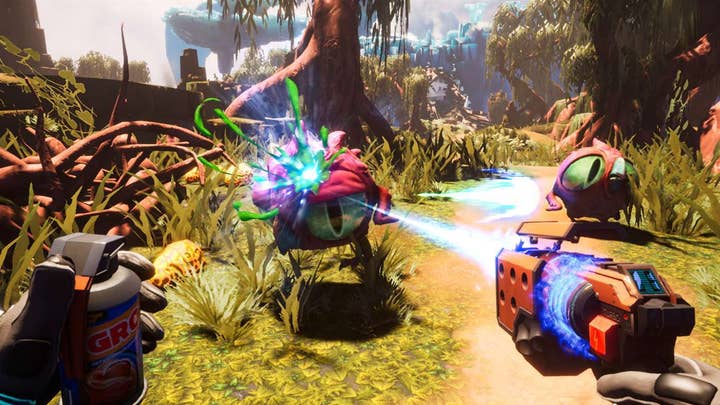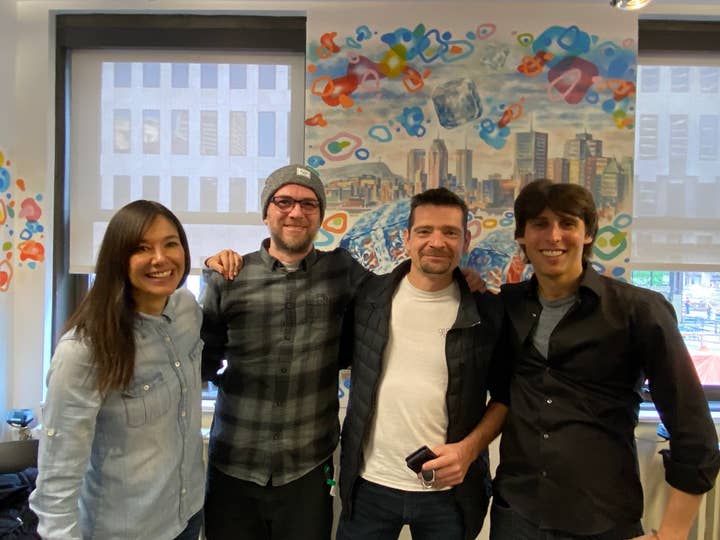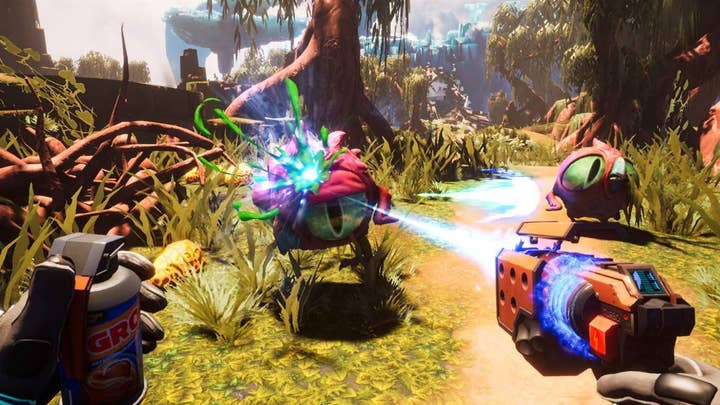Google Stadia acquires Typhoon Studios
Stadia head and Typhoon co-founders explain why the upstart studio is giving up being indie before its first game even launches
Alex Hutchinson and Reid Schneider's relatively brief foray into independent game development is over. Google announced today that it has acquired the pair's Montreal-based Typhoon Studios and will make it part of the Stadia team.
In talking with GamesIndustry.biz about the deal, Stadia Games & Entertainment head Jade Raymond says she was particularly impressed by Typhoon's ability to put together its debut title, Journey to the Savage Planet, in under three years with a modestly sized team of 26. Beyond its output, the studio also carries some impressive pedigree. Schneider was a senior producer on the original Splinter Cell and executive producer on Batman: Arkham Knight with plenty of AAA experience in between, while Hutchinson was a lead designer on The Sims 2 and Spore, as well as creative director on Assassin's Creed III and Far Cry 4.
"They've really assembled a AAA team, and the goal of acquiring the team is that it will really give us a head start in making the system-defining games everyone is waiting for," Raymond says. "This is a top AAA team of industry veterans who already have a great working relationship and were able to ship something quickly, and they have a lot of great ideas for the platform."

However, those ideas are still just ideas. When asked if Typhoon would be changing how it makes games -- either to create experiences that could only be done with cloud-processing like Stadia's or to bulk up the studio to AAA staffing levels -- Hutchinson can only say so much.
"It's very hard to feel emotional about pure tech, so our job is to bring the feels, I guess"
Alex Hutchinson
"We're just joining now so we haven't gotten deep into the discussions about exactly what's next, but certainly I think we want to stay relatively agile, and we don't want to grow to be a monster team," Hutchinson says. "But when you're focused on one platform and you have a really good group of people, I think you can make a lot of content and a lot of impact, so we want to focus on that. And obviously, our job is to lean into things that make Stadia unique -- that it's available anywhere, that it's on the cloud, that it gives us access to this sort of magic processing power -- and try to extend the ideas we have further."
As for why Schneider and Hutchinson would return to the world of corporate game development before they've even shipped their first game as an independent studio, Hutchinson says being indie was never the goal.
"The reason we started Typhoon was to work with a particular set of really high quality people, to control the vision of the game we were making, and to make cool games, basically," he says. "Those three things will be preserved moving into Stadia. We're bringing the same team with us -- all 26 people are signed up to join Stadia. I've worked with and known Jade for almost 20 years now, and Reid as well, and I'm very confident we can maintain that sense of independence as well as being great partners within the Stadia structure. Because Stadia wants us to make really great software to make the platform look good."
Schneider adds: "When Jade first approached us and explained what her vision was for Stadia, we really liked what we heard. We felt that the type of games we've made, with Savage Planet obviously being one of them, there's definitely an opportunity for us to make some really cool exclusives... The way we look at it from our perspective is that the Stadia team is obviously building an incredible technology piece. What we can provide and what we can do is we want to make some great exclusive content."
Or as Hutchinson paraphrases: "It's very hard to feel emotional about pure tech, so our job is to bring the feels, I guess."

As for when that job will be done, Raymond says we shouldn't hold our breath.
"It's very early and the team has to spend some time thinking about what it is they want to do, and how they view which exclusive features they see pushing the platform," Raymond says. "So it's not going to be tomorrow or 2020 that they're going to be shipping the next game. That being said, one of the really exciting things about welcoming these guys and the studio into the Montreal studio is it gives us a boost. It's not only a really talented AAA team that shipped multiple big successful games, but they just shipped together, they have a team dynamic, and they're up and running, so it's going to give us a head start."
"There are always pros and cons to acquisitions, and I think when you find the right culture and a really good fit like Typhoon is, it's a no-brainer"
Jade Raymond
Typhoon is the first acquisition for Stadia as Raymond looks to build out the platform's first-party offerings, and it may not be the last.
"We definitely are looking into it," she says of the possibility of future acquisitions. "Right now, apart from this acquisition, we're really focused on also building teams through organic growth. With Typhoon joining, we're going to have two full teams up and running making games in Montreal. There are always pros and cons to acquisitions, and I think when you find the right culture and a really good fit like Typhoon is, it's a no-brainer. But we take this very seriously. We want to build for the long-term. Our whole strategy is a long-term one to make the right decisions."
But in the short-term, the studio still has a first game to launch. Journey to the Savage Planet is set for a multiplatform release on January 20. The acquisition doesn't impact those plans, so the game will still be coming to the Epic Games Store, PlayStation 4 and Xbox One, but future games from Typhoon will be exclusive to Stadia. When we point out what some developers have run into with Epic Games Store exclusivity and ask about the possibility of backlash to Typhoon limiting its future output to Stadia, Hutchinson doesn't seem worried.
"I see a lot of these sort of complaints as they're historical and perennial," Hutchinson says. "They seem to come out any time there's new technology or new hardware or a new platform. I remember how everyone hated on Steam when it was released. These things come and go. There's an early, sort of allergic reaction to it from a very small but very loud percentage of the player base, and they've just become part of the ecosystem pretty quickly. I don't think we're too stressed about it. It's another double-click on your desktop; it's not a giant barrier to entry."
That said, Schneider is quick to point out that it's very important for the studio to do right by its community.
For more on Stadia's big picture strategy, check out our interview with Raymond from the weeks leading up to the service's launch.

